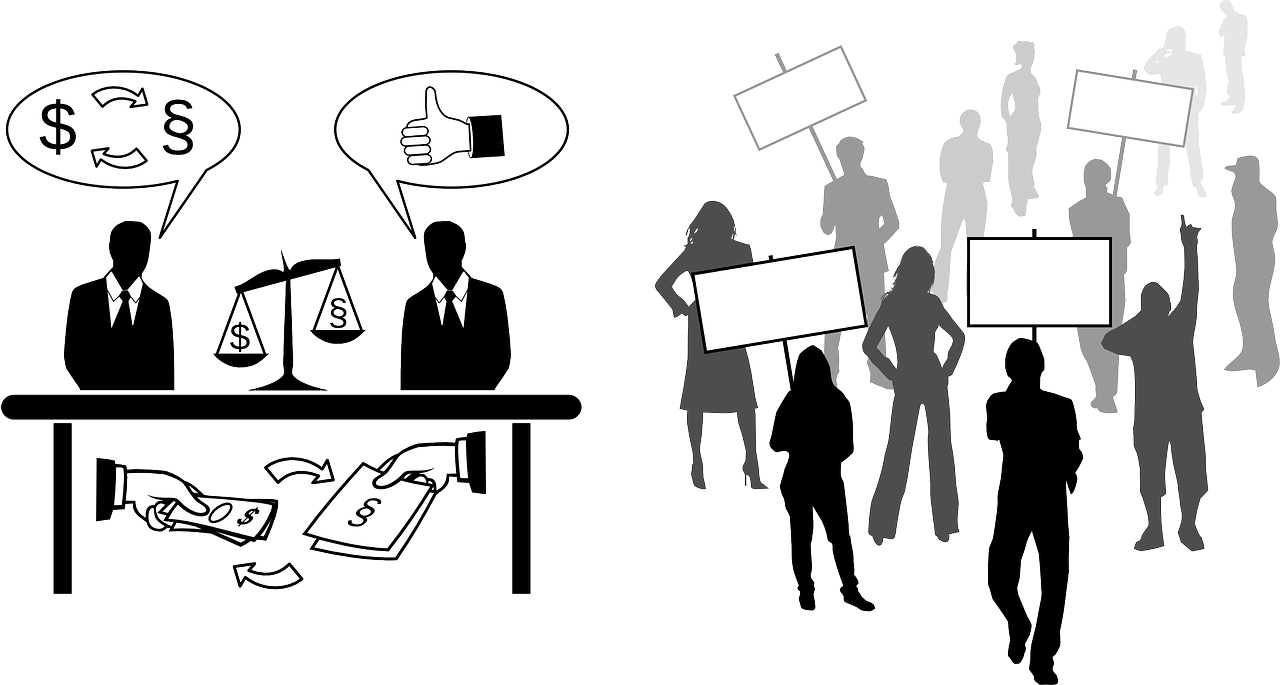Corruption – Government weakness
Corruption is a primary attack vector for gaining control over a population, therefore it is in any population’s interest to be vigilant about finding, rooting out and punishing acts of corruption. Corruption is a way of gaining favors of those in positions of authority who can grant contracts, budgets, grants, punish enemies, enact laws, etc.
Methods of corruption
Below are the most common examples of methods used to corrupt those in authority.
- Bribes –
- Direct payments
- “Political contributions” to fund political campaigns to get elected, with favors expected in return. This creates a conflict of interest between an elected official, his monetary supporters and his voters.
- Gifts – for example China the type of gift is restricted, so people will put the gift in a box made of solid gold to get around it.
- Blackmail
- Sexual blackmail – secretly record an official committing a morally questionable sexual act and then you can have control over them forever.
- Criminal blackmail – drug dealing/use
- Media/public pressure/moralizing
- Drum up outrage in the public to make a witch hunt against a person, use this to make an example to scare others from pursing whatever action is being discouraged
- Create a morality to control behavior. Label a person as immoral for violating this. “Racist”, “sexist”, “antisemitic”, are examples.
- Nepotism
- Use position of authority to give benefit to family and friends, or to a fraternal network.
- Favors
- Quid pro quo. Granting favors with the expect of getting a favor in return by those entrusted with authority for their own or their groups gain.
- Threats
- Physical threats of harm to a official or their family.
- Damaging reputation or career advancement.
- Economic threats, for example to fund an opponent or withdraw contributions if a position/vote isn’t changed
How Randviscracy prevents corruption
Randviscracy’s primary structure which is replicated throughout the government systems use panels of people selected randomly from a pool which is weighted for IQ and length of time of experience. For example, a person who ranks 90% in IQ and 10% in experience has an equal chance of being selected as a person who ranks 10% in IQ and 90% in experience. This would favor the likelihood that panels are made up of qualified and intelligent people with the more important, wide-ranging decisions having larger panels.
How does this prevent corruption?
The selection process is done by a computer, and whom is selected is kept private, the people within the panel do not know who else are on the panel. If it is unknown who to corrupt, it is impossible to corrupt them. But what if someone gets access to the computer and knows who is being selected or tampers with it?
The inner workings of the selection program and computers are open to dispute and inspection on any case (at the cost of the person filing the dispute). The program is essentially open source and the process is transparent. As an additional protection, every case has a random chance of a government planted fake candidate being entered into the pool to detect attempts at corruption.
The selection system is so central to the working of Randviscracy that it must be vigilantly protected. Attempts at hacking or corrupting the system or any part of the process would be considered treason with a minimum of 10 year prison sentence and loss of citizenship/expulsion and at maximum capital punishment.
Extensive use of the panel system
The panel system would be applied to: all government hiring, both civil and criminal courts, law making at all levels (in Randviscracy there are federal laws, state laws, city laws and syndicate (specializations that aren’t regional) laws)
- all government hiring – prevents nepotism, favors (Quid pro quo)
- civil and criminal courts – eliminates the lawyer/judge relationship corruption
- law making and tax creation at all levels (in Randviscracy there are federal laws, state laws, city laws and syndicate (specializations that aren’t regional) laws – eliminates “professional bribe taker” politicians and lobbying
- hiring for publicly traded companies – prevents nepotism
Leniency for whistle blowers
Whistle blowers who report that they are being blackmailed or are involved in corruption are granted leniency in sentencing if the people they accuse are found guilty. This helps to prevent the fear of prosecution being used to perpetuate corruption. Specifically the leniency should forgive charges of corruption and treason while still seeking compensation (at a lower rate for the whistle blower than for the accused) for damages/losses created by the corruption.
